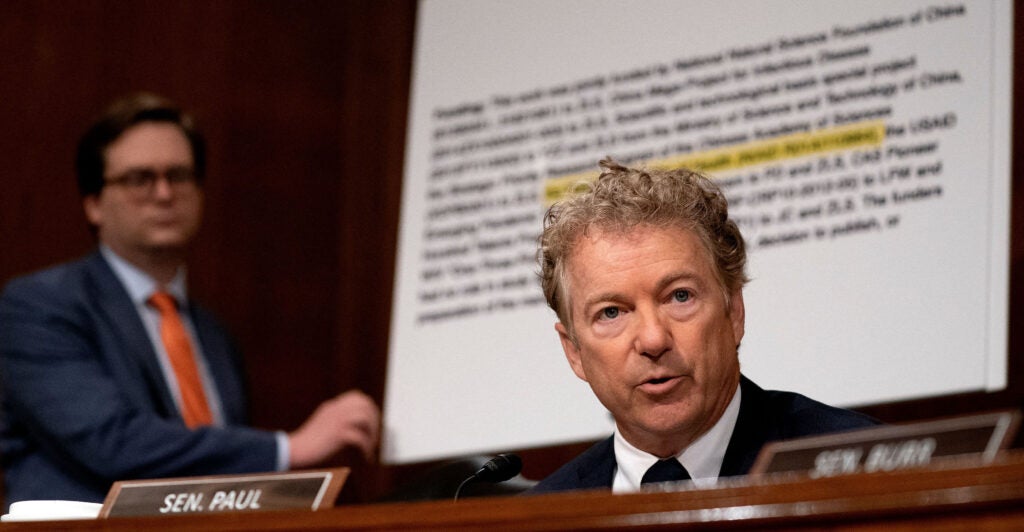Another heated exchange between Sen. Rand Paul and Dr. Anthony Fauci stole the show Tuesday at a Senate hearing on COVID-19, although participants also raised other key points.
Fauci, director of the National Institute of Allergy and Infectious Diseases, clashed publicly with the Kentucky Republican for at least the third time in recent months.
“Sen. Paul, you do not know what you are talking about, quite frankly, and I want to say that officially,” Fauci said at one point, raising his voice.
The Daily Signal depends on the support of readers like you. Donate now
Other public health officials in the Biden administration also took questions about topics such as the delta variant of COVID-19, the origins of the virus, and the potential need for vaccine booster shots. And one Donald Trump foe credited the 45th president for the availability of three vaccines.
Fauci, in his post since 1984, became a familiar face of the Trump administration’s efforts to slow COVID-19 and President Joe Biden made him his principal adviser on the issue.
Joining Fauci on a panel testifying before the Senate Health, Education, Labor and Pensions Committee were Dr. Rochelle Walensky, director of the Centers for Disease Control and Prevention; Dr. Janet Woodcock, acting commissioner of the Food and Drug Administration; and Dawn O’Connell, assistant secretary for preparedness and response at the Department of Health and Human Services.
Here are four key takeaways from the Senate hearing.
1. Paul to Fauci: ‘You Are Dancing Around This’
Paul and Fauci called each other liars during the most intense portion of the hearing, as they sparred over whether the U.S. government funded so-called gain of function research in China, where the coronavirus that causes COVID-19 originated.
“Dr. Fauci, knowing that it is a crime to lie to Congress, do you wish to retract your statement from May 11 when you claimed that the NIH [National Institutes of Health] never funded gain of function research in Wuhan?” Paul, who is a physician, asked.
Fauci responded: “Sen. Paul, I have never lied before the Congress, and I do not retract that statement.”
In May, Fauci said the United States never funded the Wuhan Institute of Virology’s gain of function projects. But new information emerging since that testimony shows that Fauci’s National Institute of Allergy and Infectious Diseases did fund research that involved making a virus more transmissible from an animal to a human.
The term “gain of function” describes a risky process of making a disease more dangerous or contagious for the purpose of studying a response.
As previously reported by The Daily Signal, the U.S. government from 2014 to 2019 gave almost $600,000 to the nonprofit EcoHealth Alliance, which in turn used the money to pay for coronavirus research at the Wuhan lab.
The National Institutes of Health, parent agency to Fauci’s institute, sent a letter to EcoHealth Alliance in July 2020, asking about its relationship with the Wuhan Institute of Virology. NIH also suspended the nonprofit’s grant, pending answers to several questions.
Specifically, NIH asked EcoHealth Alliance to explain the disappearance of a scientist who worked at the Wuhan lab, and to allow a U.S. government-led inspection of the lab.
Fauci became more heated and direct as Paul pressed him with questions at the hearing, uncharacteristically raising his voice.
“Sen. Paul, you do not know what you are talking about, quite frankly, and I want to say that officially: You do not know what you are talking about,” Fauci said, almost shouting.
Paul referred to the National Institutes of Health’s definition of gain of function research in talking about the Wuhan lab.
“They took animal viruses that only occur in animals and increased their transmissibility to humans. How can you say that is not gain of function?” Paul asked.
Fauci responded again: “It is not.”
At this point, Paul appeared to become frustrated.
“It’s a dance. You are dancing around this because you are trying to obscure responsibility for 4 million people dying around the world from a pandemic,” Paul said.
The two seemed to be addressing separate points.
Paul argued that the federal government has funded gain of function research at the Wuhan lab. Fauci argued that the research to which Paul referred didn’t turn into the coronavirus that causes COVID-19, also known as SARS-CoV-2.
“If the point that you are making is that the grant that was funded as a subaward from EcoHealth [Alliance] to Wuhan created SARS-CoV-2, that’s where you are getting … ,” Fauci said, before Paul interrupted.
“Let me finish,” Fauci shouted.

After some crosstalk between the two, Paul said: “No one is saying those viruses caused the pandemic. What we are alleging is that gain of function research was going on in those labs and NIH funded it. You can’t get away from it. It meets your definition, and you are obfuscating the truth.”
Fauci, who has been a lightning rod of controversy for months, doubled down on his interpretation of Paul’s point.
“I want everyone to understand that if you look at those viruses, and that’s judged by qualified biologists and evolutionary biologists, those viruses are molecularly impossible to result in SARS-CoV-2,” Fauci said.
Paul repeated that he wasn’t saying viruses from known gain of function research caused the COVID-19 pandemic, only that evidence shows the U.S. funded other gain of function research at the Wuhan lab.
Fauci responded: “You are implying that what we did was responsible for the deaths of individuals. I totally resent that and if anybody is lying here, Senator, it is you.”
2. ‘Sobering,’ ‘Troubling’ Delta Variant
During his opening remarks, Fauci told senators that the delta variant of COVID-19 has been spreading quickly. However, he said, research shows the three approved vaccines are effective against the variant.
“The sobering news that you’ve already heard of is the fact that we are now challenged with a very difficult and problematic variant, referred to as the delta variant,” Fauci said. “It has now been detected in at least 90-plus countries throughout the world.”
Fauci continued:
The reason it’s so formidable is the fact that it has the capability of transmitting efficiently from human to human in an extraordinary manner, well beyond any of the other variants that we have experienced to now, which has led to it becoming the dominant variant in this country.
When I spoke to you last time, it was about 1-3% of the variants in the population. Right now it has gone to over 80% and in some regions of the country, as high as 90%. That is the troubling news.
Our vaccines that we are using in this country are very effective against this variant; particularly, I would point out the situation regarding advanced disease leading to hospitalizations and deaths.
3. Tim Kaine: Vaccine a ‘Trump Accomplishment’
Sen. Tim Kaine, D-Va., was on a ticket that lost the 2016 presidential election to Donald Trump. But on Tuesday, Hillary Clinton’s running mate said that “one of the great things about President Trump” was “developing really super-effective vaccines in record time.”
In May 2020, the Trump administration set up “Operation Warp Speed” to lift regulations and other bureaucratic impediments to developing a COVID-19 vaccine by January 2021. And by January, three companies—Johnson & Johnson, Pfizer, and Moderna—had developed vaccines.
During the committee hearing, Kaine referred to a statement Sunday from Trump.
“Joe Biden kept talking about how good of a job he’s doing on the distribution of the Vaccine that was developed by Operation Warp Speed or, quite simply, the Trump Administration,” Trump said in the statement released by the Save America PAC, adding:
He’s not doing well at all. He’s way behind schedule, and people are refusing to take the Vaccine because they don’t trust his Administration, they don’t trust the Election results, and they certainly don’t trust the Fake News, which is refusing to tell the Truth.
Kaine said he was at first puzzled by correlating distrust of the 2020 election outcome with vaccine hesitancy. But he said he looked at the data and found that the 21 states with the highest vaccination rates voted for Biden, while 25 of the 30 states with lowest rate of vaccinations voted for Trump.
“There is a difference between causation and correlation, but possibly what the president said, there may be something to it,” Kaine said. “Repeated disinformation about the election is now connecting in people’s minds about willingness to take the vaccine. It didn’t have to be this way.”
The Virginia Democrat said Trump and his administration deserve credit for speedy development of vaccines to fight the coronavirus.
“One of the great things about President Trump and the Trump administration, working with partners and funded by Congress, was setting a world record in terms of developing really super-effective vaccines in record time,” Kaine said.
The former president has urged the public to get a vaccination, although he hasn’t talked at length about the matter.
Kaine said Trump should do more to encourage the public to get vaccinated.
“He could still tout it,” Kaine said. “He could say this was a Trump accomplishment and urge people in these states who are lagging behind the national average to get vaccinated. That won’t solve all the problems, because there are many reasons people don’t get vaccinated.”
On Monday, a reporter asked White House press secretary Jen Psaki whether Biden would ask Trump to advocate publicly for Americans to get vaccinated against COVID-19. Psaki said there was no interest in that.
“We’ve seen almost every former president play a role in putting out a PSA [public service announcement], making sure people understood in the country that the vaccine is safe and effective,” Psaki said, adding:
We don’t believe that requires an embroidered invitation to be a part of. But certainly, any role of anyone who has a platform where they can provide information to the public that the vaccine is safe, it is effective—we don’t see this as a political issue—we’d certainly welcome that engagement.
Trump, of course, lost his powerful platforms on Twitter and Facebook before he left office, when those Big Tech corporations decided that he was spreading what they called misinformation or extreme rhetoric.
4. ‘Lose the Trust’ on Booster Shot
Fauci told senators that the federal government is “doing studies to determine whether or not we will need boosters” to extend the effectiveness of the vaccine.
“We don’t want people to believe that when you are talking about boosters, that means the vaccines are not effective,” Fauci told the committee. “They are highly effective. We are talking about the durability of that.”
However, the Israeli Ministry of Health last week informed some health agencies that they could start administering a third dose of the Pfizer vaccine, or a booster, for those with a compromised immune system or other specific conditions.
The Jerusalem Post reported that this could include those with rheumatological or autoimmune diseases; those with hematologic malignancies or with cancer; and certain transplant recipients.
Committee Chairwoman Patty Murray, D-Wash., asked: “How will the administration determine if booster shots are needed?”
Fauci and others responded that research is ongoing.
This was bothersome to Sen. Richard Burr, R-N.C., who said the response from officials about a booster shot indicated “we haven’t learned anything.”
The committee’s ranking member, Burr noted mistakes and delayed response from the Centers for Disease Control and Prevention and other public health agencies in 2020 as COVID-19 spread.
“To say we are going to make this decision based on research we’ve got going on in CDC based on the information we’ve put out and only our research counts, to basically ignore the Israeli data or the Pfizer data—I’m not suggesting we are entirely doing that,” Burr said, cutting himself off.
“My question would be: Has Israel given us transparency into their data?” Burr asked. “I realize we want accuracy, but do we really have to wait for CDC to complete the data? Do you think you are going to come to a different conclusion than Israel did?”
Walinsky, head of the CDC, said the United States has worked with researchers from Israel and other countries:
We’ve already had two conversations with Israel. We have data sharing from our cohorts as well as from theirs. We also have been in discussions with the U.K. to see what data they have, because they are several weeks ahead of us on the delta variant. We intend to leverage all of the data we have around the world to share liberally with other countries in the hopes they will share with us, so that we can make the proper decisions here and around the world.
Burr still seemed unimpressed.
“They [Israel] have made a decision to do boosters based on their data,” Burr said. “And we are saying we are still going to work out our research to determine. That is where you begin to lose the trust of the American people in our health care experts.”
Ken McIntyre contributed to this report.
Have an opinion about this article? To sound off, please email letters@DailySignal.com and we’ll consider publishing your edited remarks in our regular “We Hear You” feature. Remember to include the url or headline of the article plus your name and town and/or state.
































